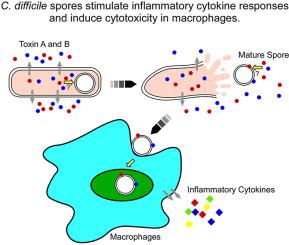Anaerobe ( IF 2.5 ) Pub Date : 2021-05-31 , DOI: 10.1016/j.anaerobe.2021.102381 Po-Jung Chiu , Jagat Rathod , Yu-Ping Hong , Pei-Jane Tsai , Yuan-Pin Hung , Wen-Chien Ko , Jenn-Wei Chen , Daniel Paredes-Sabja , I-Hsiu Huang

|
Clostridioides difficile is a gram-positive, spore-forming anaerobic bacterium, and the leading cause of antibiotic-associated diarrhea worldwide. During C. difficile infection, spores germinate in the presence of bile acids into vegetative cells that subsequently colonize the large intestine and produce toxins. In this study, we demonstrated that C. difficile spores can universally adhere to, and be phagocytosed by, murine macrophages. Only spores from toxigenic strains were able to significantly stimulate the production of inflammatory cytokines by macrophages and subsequently induce significant cytotoxicity. Spores from the isogenic TcdA and TcdB double mutant induced significantly lower inflammatory cytokines and cytotoxicity in macrophages, and these activities were restored by pre-exposure of the spores to either toxins. These findings suggest that during sporulation, spores might be coated with C. difficile toxins from the environment, which could affect C. difficile pathogenesis in vivo.
中文翻译:

艰难梭菌孢子刺激炎性细胞因子反应并诱导巨噬细胞的细胞毒性
艰难梭菌是一种革兰氏阳性、产芽孢厌氧菌,是全世界抗生素相关性腹泻的主要原因。在艰难梭菌感染期间,孢子在胆汁酸存在下萌发进入营养细胞,随后在大肠中定殖并产生毒素。在这项研究中,我们证明了艰难梭菌孢子可以普遍粘附在鼠巨噬细胞上并被其吞噬。只有产毒菌株的孢子才能显着刺激巨噬细胞产生炎性细胞因子,并随后诱导显着的细胞毒性。来自同基因 TcdA 和 TcdB 双突变体的孢子在巨噬细胞中诱导显着降低的炎性细胞因子和细胞毒性,并且这些活性通过将孢子预先暴露于任一毒素而恢复。这些发现表明,在孢子形成过程中,孢子可能被环境中的艰难梭菌毒素包裹,这可能会影响体内艰难梭菌的发病机制。











































 京公网安备 11010802027423号
京公网安备 11010802027423号